Unit 2 Let's play sports Grammar 课件(共19张PPT)牛津译林版英语七年级上册
文档属性
| 名称 | Unit 2 Let's play sports Grammar 课件(共19张PPT)牛津译林版英语七年级上册 |
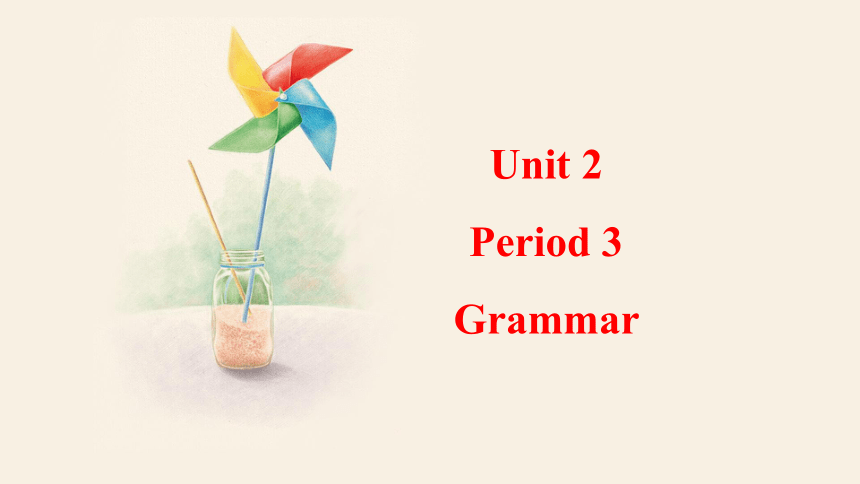
|
|
| 格式 | pptx | ||
| 文件大小 | 1.0MB | ||
| 资源类型 | 教案 | ||
| 版本资源 | 牛津译林版 | ||
| 科目 | 英语 | ||
| 更新时间 | 2023-12-20 00:00:00 | ||
图片预览



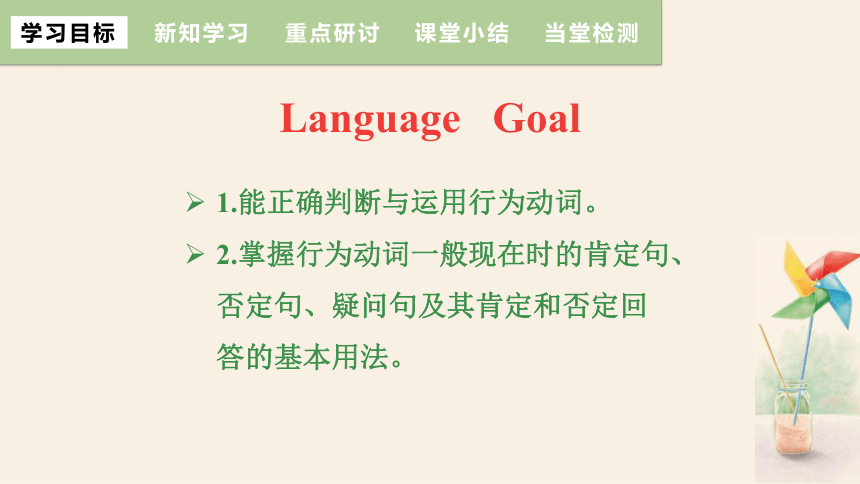
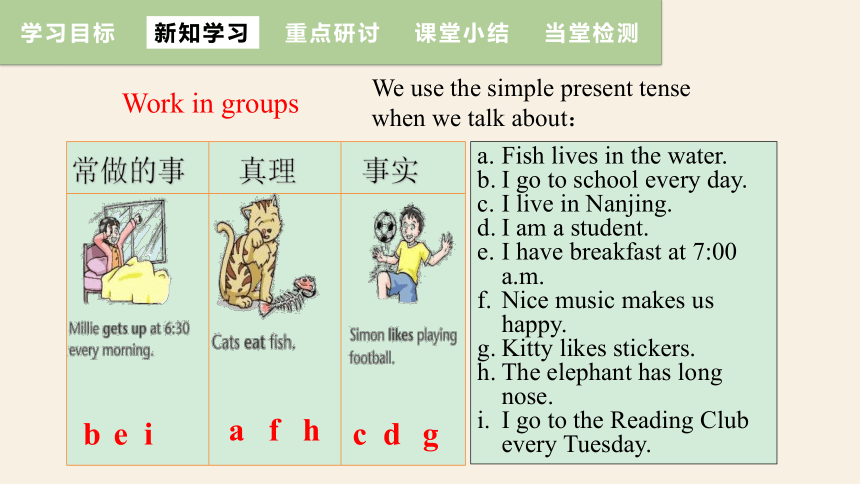
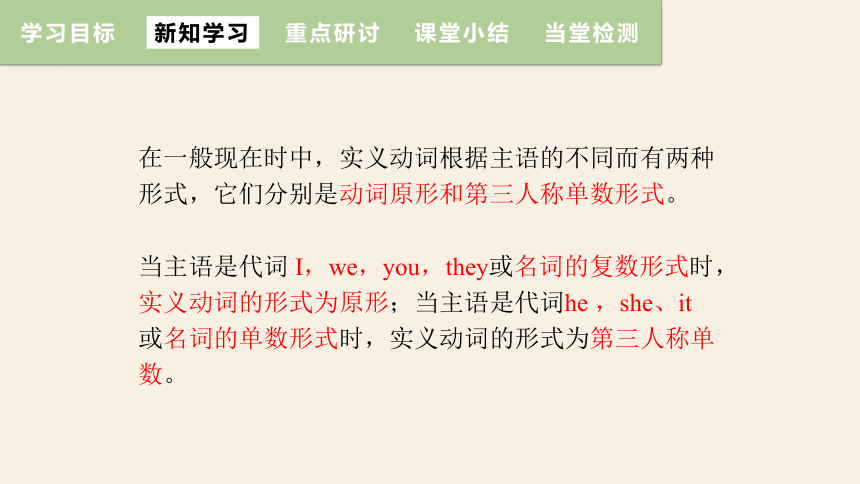
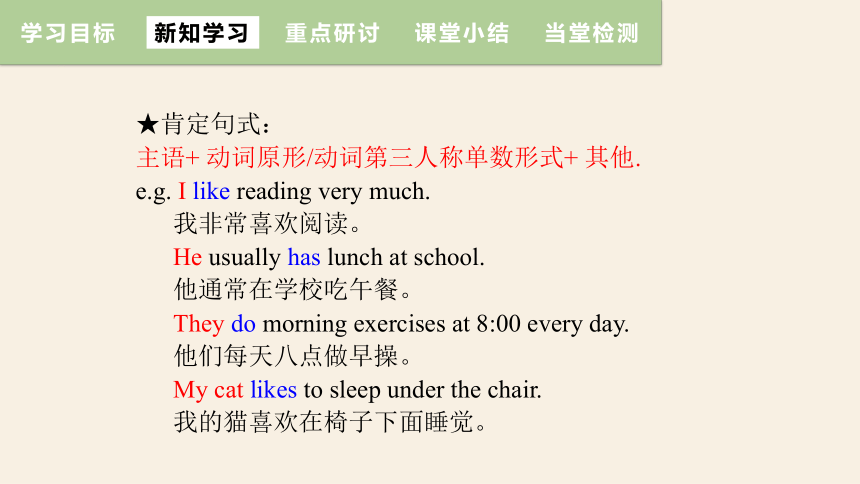
文档简介
(共19张PPT)
Unit 2
Period 3
Grammar
新
课
导
入
Free Talk
12/19/2023
do
实义动词
实义动词是指表示某种动作行为,有具体意思的动词,也叫行为动词。
如: eat, have, run, swim 等等,它们的意思分别是:“吃”、“有”、“跑”、“游泳”等等,这些都是实义动词。
实义动词占英语中动词的绝大多数。
新
课
导
入
I like reading.
She likes running.
They often play football after school.
Li Hua plays football very well.
Lily is good at dancing. She loves it very much.
找出下列句子中的实义动词:
Language Goal
1.能正确判断与运用行为动词。
2.掌握行为动词一般现在时的肯定句、否定句、疑问句及其肯定和否定回答的基本用法。
新知学习
课堂小结
当堂检测
学习目标
重点研讨
We use the simple present tense when we talk about:
常做的事
真理
事实
Fish lives in the water.
I go to school every day.
I live in Nanjing.
I am a student.
I have breakfast at 7:00 a.m.
Nice music makes us happy.
Kitty likes stickers.
The elephant has long nose.
I go to the Reading Club every Tuesday.
b
a
c
d
e
g
h
i
f
Work in groups
新知学习
课堂小结
当堂检测
学习目标
重点研讨
在一般现在时中,实义动词根据主语的不同而有两种形式,它们分别是动词原形和第三人称单数形式。
当主语是代词 I,we,you,they或名词的复数形式时,实义动词的形式为原形;当主语是代词he ,she、it 或名词的单数形式时,实义动词的形式为第三人称单数。
新知学习
课堂小结
当堂检测
学习目标
重点研讨
★肯定句式:
主语+ 动词原形/动词第三人称单数形式+ 其他.
e.g. I like reading very much.
我非常喜欢阅读。
He usually has lunch at school.
他通常在学校吃午餐。
They do morning exercises at 8:00 every day.
他们每天八点做早操。
My cat likes to sleep under the chair.
我的猫喜欢在椅子下面睡觉。
新知学习
课堂小结
当堂检测
学习目标
重点研讨
★否定句式:
主语+ do not / does not + 动词原形+ 其他.
e.g. I do not like (don’t) drinking milk.
我不喜欢喝牛奶。
My brother does not (doesn’t) have breakfast at home.
我哥哥不在家吃早餐。
They do not (don’t) go to school on Sundays.
他们星期天不上学。
新知学习
课堂小结
当堂检测
学习目标
重点研讨
★一般疑问句式及答语:
Do / Does +主语+ 动词原形+ 其他
e.g. 1. —Do you get up at 6:00 every
morning
你每天早上六点起床吗?
—Yes, I do. / No, I don’t.
是的,我是。/ 不,我不是。
新知学习
课堂小结
当堂检测
学习目标
重点研讨
1. Most verbs + s : like — play—
likes
3. Verbs ending in ch, sh, ss or x +es
watch— wash—
dress— fix—
2. Verbs ending in a consonant +y –y + ies
study— cry—
4. Some verbs ending in o +es
go— do—
plays
studies
cries
watches
washes
dresses
fixes
goes
does
How to add -s or -es to a verb.
新知学习
课堂小结
当堂检测
学习目标
重点研讨
1. I playing volleyball.
2. Kitty very well.
3. Amy swimming every week.
4. Simon often football with his friends.
5. Daniel sometimes ball games on TV.
like
dances
goes
plays
watches
Millie and her classmate
dance go like play watch
A
新知学习
课堂小结
当堂检测
学习目标
重点研讨
_____Sandy and Kitty enjoy listening to music
_____Millie like swimming
______Amy enjoy reading
______Simon like walking
_______Simon and Daniel love drawing
Yes, they do.
No, she doesn’t.
Yes, she does.
No, he doesn’t.
No, they don’t.
Do
Does
Does
Does
Do
B
新知学习
课堂小结
当堂检测
学习目标
重点研讨
Daniel: Hi, Simon. ________you _______(play)
football at weekends
Simon: Of course. I often ___________(play) football
with my cousins.
Daniel: ________your parents _______(go) with you
Simon: No, they don’t. But my dad sometimes
_________(watch) our games. Sometimes he
_________(read) at home. My mum often
_________(shop) at weekends. What about
you, Daniel
Daniel: I often _________(stay) at home. Sometimes
I __________(go) swimming with my dad.
Do
play
play
Do
go
watches
reads
shops
stay
go
C
新知学习
课堂小结
当堂检测
学习目标
重点研讨
Language Points
新知学习
课堂小结
当堂检测
学习目标
重点研讨
一、什么叫英语的时态?
英语中不同时间和方式发生的动作或状态要用不同形式的谓语动词来表示,也就是说时态就是某种动词形式。英语中有16种时态。
新知学习
课堂小结
当堂检测
学习目标
重点研讨
二、什么叫第三人称单数?
英语中人称的划分
第一人称:I( 第一人称单数),we(第一人称复数)
第二人称:you (作“你”为第二人称单数,作“你们”为第二人称复数)
第三人称:除第一、第二人称外都属于第三人称,指单个人或事物的就属于第三人称单数,如:he, she, it, Millie, the cat, a desk, China, my classmate等等。
在一般现在时中,当主语是第三人称单数时,其肯定句的谓语动词要用第三人称单数的动词形式,疑问句和否定句中要用does作助动词。
新知学习
课堂小结
当堂检测
学习目标
重点研讨
三、什么叫行为动词?
有具体、实际含义的动词叫行为动词,如come, go, run, think, stand等。
注意:be动词不属于行为动词。在一般现在时中,以行为动词作谓语时不能再使用be动词。如:
(√)
(√)
(×)
He is from China.
He comes from China.
He is comes from China.
新知学习
课堂小结
当堂检测
学习目标
重点研讨
四、何时使用一般现在时?
行为动词的一般现在时可用于以下情况:
1. 表示经常性、习惯性的动作用一般现在时。
e.g. He reads English every day.
2. 表示现在的能力、特征、喜好等。
e.g. Do you like playing volleyball
3. 不受时限的客观事实。
e.g. Cats eat fish.
行为动词的一般现在时结构:
1. 当主语是第一人称、第二人称、第三人称复数时,谓语动词以动词原形构成;2. 否定句的构成do not/don’t + V原;3. 一般疑问句式及答语:Do / Does +主语+ 动词原形+ 其他
Unit 2
Period 3
当主语为第三人称单数时谓语动词用第三人称单数形式。
1.大多数动词直接在动词后面加s;
2.以 sh,ch,ss, x和o结尾的动词加es;
3.以辅音字母加y结尾的,把y改成ies;
4.以元音字母加y结尾的动词,直接加s;
5.不规则动词需谨记。
新知学习
课堂小结
当堂检测
学习目标
重点研讨
1. Mike usually goes to the Reading Club after school. (改为否定句)
Mike _______ usually _____ to the Reading Club after school.
2. David likes drawing very much.
(改为一般疑问句,并作肯定回答)
______ David _____ drawing very much ____, he _______.
3. Li Yan ’s grandparents take a walk after dinner every day.
(改为一般疑问句,并作否定回答)
____ Li Yan ’s grandparents _____ a walk after dinner every day
_____, they __________.
doesn’t go
Does like
Yes does
Do take
No don’t
新知学习
课堂小结
当堂检测
学习目标
重点研讨
根据题后括号内的要求完成下列句子。
Unit 2
Period 3
Grammar
新
课
导
入
Free Talk
12/19/2023
do
实义动词
实义动词是指表示某种动作行为,有具体意思的动词,也叫行为动词。
如: eat, have, run, swim 等等,它们的意思分别是:“吃”、“有”、“跑”、“游泳”等等,这些都是实义动词。
实义动词占英语中动词的绝大多数。
新
课
导
入
I like reading.
She likes running.
They often play football after school.
Li Hua plays football very well.
Lily is good at dancing. She loves it very much.
找出下列句子中的实义动词:
Language Goal
1.能正确判断与运用行为动词。
2.掌握行为动词一般现在时的肯定句、否定句、疑问句及其肯定和否定回答的基本用法。
新知学习
课堂小结
当堂检测
学习目标
重点研讨
We use the simple present tense when we talk about:
常做的事
真理
事实
Fish lives in the water.
I go to school every day.
I live in Nanjing.
I am a student.
I have breakfast at 7:00 a.m.
Nice music makes us happy.
Kitty likes stickers.
The elephant has long nose.
I go to the Reading Club every Tuesday.
b
a
c
d
e
g
h
i
f
Work in groups
新知学习
课堂小结
当堂检测
学习目标
重点研讨
在一般现在时中,实义动词根据主语的不同而有两种形式,它们分别是动词原形和第三人称单数形式。
当主语是代词 I,we,you,they或名词的复数形式时,实义动词的形式为原形;当主语是代词he ,she、it 或名词的单数形式时,实义动词的形式为第三人称单数。
新知学习
课堂小结
当堂检测
学习目标
重点研讨
★肯定句式:
主语+ 动词原形/动词第三人称单数形式+ 其他.
e.g. I like reading very much.
我非常喜欢阅读。
He usually has lunch at school.
他通常在学校吃午餐。
They do morning exercises at 8:00 every day.
他们每天八点做早操。
My cat likes to sleep under the chair.
我的猫喜欢在椅子下面睡觉。
新知学习
课堂小结
当堂检测
学习目标
重点研讨
★否定句式:
主语+ do not / does not + 动词原形+ 其他.
e.g. I do not like (don’t) drinking milk.
我不喜欢喝牛奶。
My brother does not (doesn’t) have breakfast at home.
我哥哥不在家吃早餐。
They do not (don’t) go to school on Sundays.
他们星期天不上学。
新知学习
课堂小结
当堂检测
学习目标
重点研讨
★一般疑问句式及答语:
Do / Does +主语+ 动词原形+ 其他
e.g. 1. —Do you get up at 6:00 every
morning
你每天早上六点起床吗?
—Yes, I do. / No, I don’t.
是的,我是。/ 不,我不是。
新知学习
课堂小结
当堂检测
学习目标
重点研讨
1. Most verbs + s : like — play—
likes
3. Verbs ending in ch, sh, ss or x +es
watch— wash—
dress— fix—
2. Verbs ending in a consonant +y –y + ies
study— cry—
4. Some verbs ending in o +es
go— do—
plays
studies
cries
watches
washes
dresses
fixes
goes
does
How to add -s or -es to a verb.
新知学习
课堂小结
当堂检测
学习目标
重点研讨
1. I playing volleyball.
2. Kitty very well.
3. Amy swimming every week.
4. Simon often football with his friends.
5. Daniel sometimes ball games on TV.
like
dances
goes
plays
watches
Millie and her classmate
dance go like play watch
A
新知学习
课堂小结
当堂检测
学习目标
重点研讨
_____Sandy and Kitty enjoy listening to music
_____Millie like swimming
______Amy enjoy reading
______Simon like walking
_______Simon and Daniel love drawing
Yes, they do.
No, she doesn’t.
Yes, she does.
No, he doesn’t.
No, they don’t.
Do
Does
Does
Does
Do
B
新知学习
课堂小结
当堂检测
学习目标
重点研讨
Daniel: Hi, Simon. ________you _______(play)
football at weekends
Simon: Of course. I often ___________(play) football
with my cousins.
Daniel: ________your parents _______(go) with you
Simon: No, they don’t. But my dad sometimes
_________(watch) our games. Sometimes he
_________(read) at home. My mum often
_________(shop) at weekends. What about
you, Daniel
Daniel: I often _________(stay) at home. Sometimes
I __________(go) swimming with my dad.
Do
play
play
Do
go
watches
reads
shops
stay
go
C
新知学习
课堂小结
当堂检测
学习目标
重点研讨
Language Points
新知学习
课堂小结
当堂检测
学习目标
重点研讨
一、什么叫英语的时态?
英语中不同时间和方式发生的动作或状态要用不同形式的谓语动词来表示,也就是说时态就是某种动词形式。英语中有16种时态。
新知学习
课堂小结
当堂检测
学习目标
重点研讨
二、什么叫第三人称单数?
英语中人称的划分
第一人称:I( 第一人称单数),we(第一人称复数)
第二人称:you (作“你”为第二人称单数,作“你们”为第二人称复数)
第三人称:除第一、第二人称外都属于第三人称,指单个人或事物的就属于第三人称单数,如:he, she, it, Millie, the cat, a desk, China, my classmate等等。
在一般现在时中,当主语是第三人称单数时,其肯定句的谓语动词要用第三人称单数的动词形式,疑问句和否定句中要用does作助动词。
新知学习
课堂小结
当堂检测
学习目标
重点研讨
三、什么叫行为动词?
有具体、实际含义的动词叫行为动词,如come, go, run, think, stand等。
注意:be动词不属于行为动词。在一般现在时中,以行为动词作谓语时不能再使用be动词。如:
(√)
(√)
(×)
He is from China.
He comes from China.
He is comes from China.
新知学习
课堂小结
当堂检测
学习目标
重点研讨
四、何时使用一般现在时?
行为动词的一般现在时可用于以下情况:
1. 表示经常性、习惯性的动作用一般现在时。
e.g. He reads English every day.
2. 表示现在的能力、特征、喜好等。
e.g. Do you like playing volleyball
3. 不受时限的客观事实。
e.g. Cats eat fish.
行为动词的一般现在时结构:
1. 当主语是第一人称、第二人称、第三人称复数时,谓语动词以动词原形构成;2. 否定句的构成do not/don’t + V原;3. 一般疑问句式及答语:Do / Does +主语+ 动词原形+ 其他
Unit 2
Period 3
当主语为第三人称单数时谓语动词用第三人称单数形式。
1.大多数动词直接在动词后面加s;
2.以 sh,ch,ss, x和o结尾的动词加es;
3.以辅音字母加y结尾的,把y改成ies;
4.以元音字母加y结尾的动词,直接加s;
5.不规则动词需谨记。
新知学习
课堂小结
当堂检测
学习目标
重点研讨
1. Mike usually goes to the Reading Club after school. (改为否定句)
Mike _______ usually _____ to the Reading Club after school.
2. David likes drawing very much.
(改为一般疑问句,并作肯定回答)
______ David _____ drawing very much ____, he _______.
3. Li Yan ’s grandparents take a walk after dinner every day.
(改为一般疑问句,并作否定回答)
____ Li Yan ’s grandparents _____ a walk after dinner every day
_____, they __________.
doesn’t go
Does like
Yes does
Do take
No don’t
新知学习
课堂小结
当堂检测
学习目标
重点研讨
根据题后括号内的要求完成下列句子。
同课章节目录
- 预备课程
- Lesson 1 Nice to meet you !
- Lesson 2 A happy family
- Lesson 3 A nice school
- Lesson 4 You look cool !
- Lesson 5 Wonderful things
- Lesson 6 Have nice food
- Lesson 7 Enjoy our days
- Lesson 8 Let's have fun !
- Unit 1 This is me
- Unit 2 Let's play sports
- Unit 3 Welcome to our school
- Unit 4 My day
- Unit 5 Let’s celebrate
- Unit 6 Food and lifestyle
- Unit 7 Shopping
- Unit 8 Fashion
